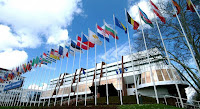As the very worrisome and sad events of the Russian invasion of Ukraine are rapidly and brutally unfolding this week, causing both human suffering and human rights violations, the very fabric of peace and the international rule of law in Europe seem to be deeply at stake. The Council of Europe has just announced suspending Russia's voting rights in the Council of Europe. It announced:
"In line with the Statute of the Council of Europe, the Committee of Ministers has today decided to suspend the Russian Federation from its rights of representation in the Committee of Ministers and in the Parliamentary Assembly with immediate effect as a result of the Russian Federation’s armed attack on Ukraine.
The decision adopted today means that the Russian Federation remains a member of the Council of Europe and party to the relevant Council of Europe conventions, including the European Convention on Human Rights.
The judge elected to the European Court of Human Rights in respect of the Russian Federation also remains a member of the Court, and applications introduced against the Russian Federation will continue to be examined and decided by the Court. Suspension is not a final measure but a temporary one, leaving channels of communication open."
And apart from Ukraine itself several neighbouring countries have announced a state of emergency.
It raises, once again, the issue of how the Council of Europe, and its ECHR system should deal with states flouting their human rights and other commitments. Earlier this week, another development at the Council of Europe also occurred as part of this broader debate. For only the second time in history, the Committee of Ministers, in its supervisory function re the execution of judgments of the European Court initiated an infringement procedure under Article 46, para. 4 ECHR. The situation relates to the case of the imprisoned businessman and human rights defender Mehmet Osman Kavala. In December 2019, the Court had found violations of both Articles 5 and 18 and indicated Turkey should release him. The Grand Chamber will now have to appraise whether Turkey has failed in its obligation to execute the binding judgments of the Court. A very rare step in itself.

